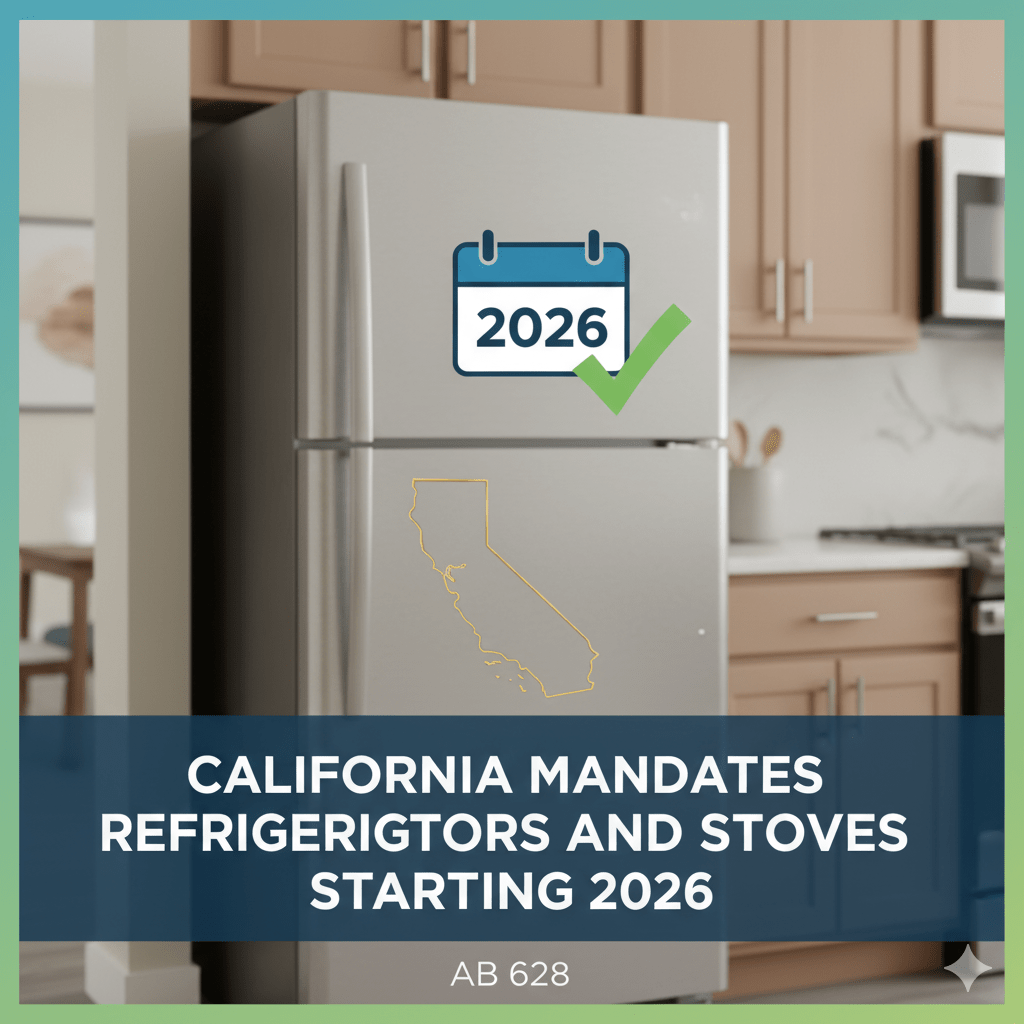
Property management in California is undergoing a rapid evolution, moving toward higher standards of living and increased landlord responsibility. A key change that every property owner must be aware of is the passage of Assembly Bill 628 (AB 628), which redefines what constitutes a legally habitable rental unit.
Starting in 2026, the era of the “BYO-Fridge” rental unit, particularly common in Southern California, is officially over.
The AB 628 Requirement: Appliances as Habitability
AB 628, signed by Governor Newsom, elevates two major appliances from optional “amenities” to core components of a tenantable dwelling.
Effective January 1, 2026, for any lease that is entered into, renewed, or amended on or after that date, California landlords must ensure the unit includes:
- A working stove capable of safely generating heat for cooking.
- A working refrigerator capable of safely storing food.
This change is significant because it ties the function of these appliances directly to the statutory standard of habitability (Civil Code § 1941.1). If a unit lacks these items, or if the provided appliances become non-functional or are under a manufacturer’s recall, the unit may be deemed legally uninhabitable, exposing the landlord to potential tenant remedies like repair-and-deduct claims or rent withholding.
Key Compliance Details for Landlords
Landlords must adjust their operational and leasing strategies well before the 2026 deadline.
1. The Maintenance Mandate
Unlike a tenant-supplied appliance, the landlord is responsible for maintaining the provided stove and refrigerator in good working order. Furthermore, the law requires landlords to repair or replace a recalled appliance (stove or refrigerator) within 30 days of receiving notice.
2. The Tenant Opt-Out Provision
Tenants may still want to bring their own refrigerator, but the law places strict rules around this:
- Voluntary Choice: The landlord cannot condition a tenancy on the tenant providing their own refrigerator.
- Written Agreement: The agreement for the tenant to provide their own fridge must be mutual and included in the signed lease.
- Flexibility: The tenant retains the right to give the landlord 30 days’ written notice that they no longer wish to use their own refrigerator, after which the landlord must install a compliant refrigerator at their own expense.
3. Exemptions
The law is not universal. It exempts certain housing types, including permanent supportive housing, single-room occupancy units (SROs), residential hotels, and housing with shared or communal kitchen spaces.
🛠️ Your Immediate Compliance Checklist
The most effective way to manage this new mandate is to act now, using 2025 to budget and phase in changes:
- Audit Your Portfolio: Inventory every unit that currently lacks a stove or refrigerator and estimate the cost of purchasing and installing compliant models.
- Budget for the Future: Factor in the ongoing costs for maintenance, repairs, and eventual replacement of these newly mandated appliances.
- Update Lease Documents: Work with your legal counsel or property management association to update your lease agreements with the mandatory AB 628 language, particularly the clause outlining the tenant’s right to opt out of a landlord-provided fridge.
The refrigerator mandate is a clear signal: property management compliance is becoming more complex, expensive, and legally exposed. Staying ahead of regulatory waves, from appliance mandates to new energy efficiency requirements, is the only way to ensure your California investment remains protected and profitable.

Kurt Galitski- Principal, Broker
(949) 688 7705 | DRE #: 01348644
2919 Newport Blvd, Newport Beach, CA 92663
DISCLAIMER: This article is for informational and educational purposes only and is based on publicly available data from official state and county sources. We are NOT tax professionals, financial advisors, CPAs, or attorneys. The information provided does not constitute legal, tax, or financial advice.